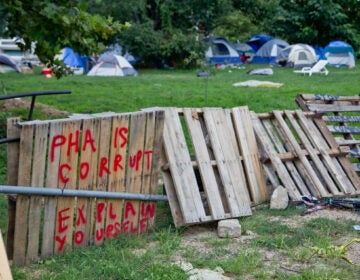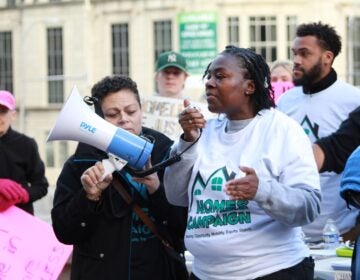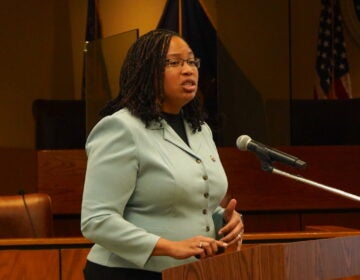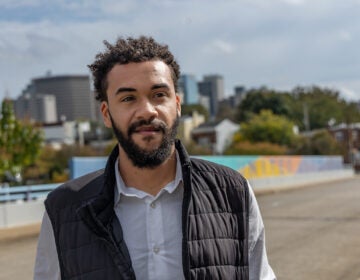A historic deal on affordable housing in Philly
City and federal housing officials struck a historic deal with organizers of Philly's homeless encampments. How far will it go in fixing Philly's affordable housing crisis?
Listen 15:42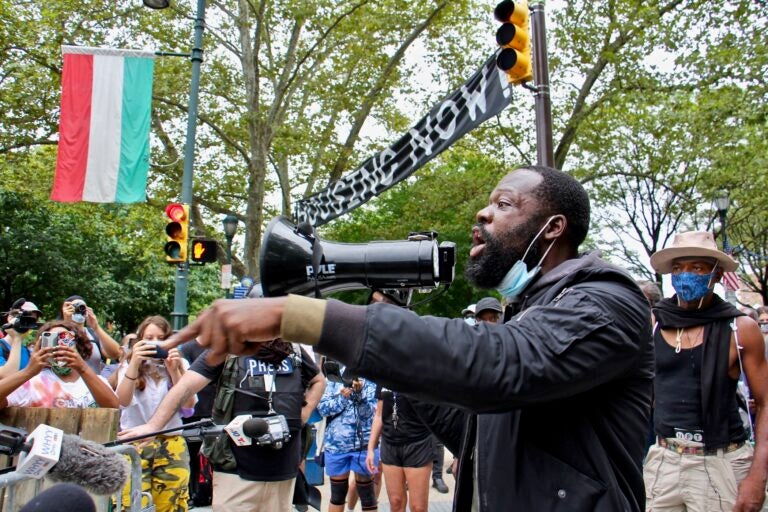
Anthony Lloyd, a resident of the homeless encampment on the Ben Franklin Parkway challenges the city’s order to clear the camp. (Emma Lee/WHYY)
It was a movement born out of the George Floyd protests for racial justice: Hundreds of people who had experienced homelessness camped out on the Ben Franklin Parkway, on Ridge Avenue and squatted in empty houses across Philadelphia to demand affordable housing.
Finally, after months of negotiations with the city and federal housing officials, the two sides have come to an agreement that will clear the encampments and provide permanent housing for residents.
WHYY’s Susan Phillips explains how this historic deal was struck, and whether it could make a dent in Philadelphia’s affordable housing problem.

Hear the whole story on The Why
Interview Highlights
On the state of affordable housing and homelessness in Philly
It’s pretty bad. There is an estimate of 5,500 people who are homeless in the city, and there’s an astounding number of people on a waiting list for public housing right now. There’s about 47,000 people on this waiting list, and the list itself has not accepted anymore people for the past couple of years.
And this also begs the question, what is affordable? And one of the messages from a lot of the people in that camp was that, look, the income levels that you’re basing affordable housing on are much higher than what a lot of people make. They were [also] demanding permanent housing. A lot of these people were tired of living in shelters. One of the things I heard over and over again from people is basically these shelters, they have a lot of rules. You have to get back to the shelter 8:00 at night and leave by 6:00 in the morning … They often described it as a low-level prison.
On what makes this protest unique
The encampments themselves are not new. So what’s new is that this particular encampment was very deliberate as a form of protest. Previous encampments in the city have simply been housing solutions, right? People tend to start pitching tents together because they can share resources. But those situations have always been broken up by the city whereas in this case, the barricades went up when the eviction notices were posted. So this was very different in that respect, that it combined an encampment with a deliberate protest, with specific demands. One of the things that Dennis Culhane, [a former housing activist and a professor at the University of Pennsylvania] says is that this is unique and it’s important because oftentimes those who are homeless are really at the bottom of the list when it comes to permanent affordable housing options.
On the terms of the deal
The deal is they will get about 50 houses that are owned by the federal government and the city to fix up and it will become a land trust. Basically, what a land trust is is a nonprofit organization that will own these houses and these houses will be affordable housing forever. There are a number of other solutions that are on the table as well. There’s the creation of a tiny house village the city promised to start building by the end of this year … It’s basically an outdoor shelter, like people have their own wooden house. Basically, it’s the size of a bedroom. And then they share kitchen and bathroom facilities. So there’s a number of different solutions that they negotiated at the at the bargaining table.
On the longterm impact of the deal
That’s a question that’s on my mind right now: Is is this sort of a one-shot deal or does something much longer term come out of this? So will the activists and will some of the homeless people now be working more directly with, say, the city’s Office of Homeless Services or with [the Philadelphia Housing Authority] to help solve some of these problems in ways that are agreeable to all sides? And also … people are expecting that because of the pandemic, the economic crisis that that’s created — people are expecting a lot more evictions and they’re expecting a lot more homelessness in response to that, unless there are more dollars spent in a relief package at the federal level. So will this solve homelessness in the city of Philadelphia? No. Will it help create a system that is more inclusive about how to address these issues in the future? That’s something we’ll just have to wait and see.
 WHYY is one of over 20 news organizations producing Broke in Philly, a collaborative reporting project on solutions to poverty and the city’s push towards economic justice. Follow us at @BrokeInPhilly.
WHYY is one of over 20 news organizations producing Broke in Philly, a collaborative reporting project on solutions to poverty and the city’s push towards economic justice. Follow us at @BrokeInPhilly.
WHYY is your source for fact-based, in-depth journalism and information. As a nonprofit organization, we rely on financial support from readers like you. Please give today.





